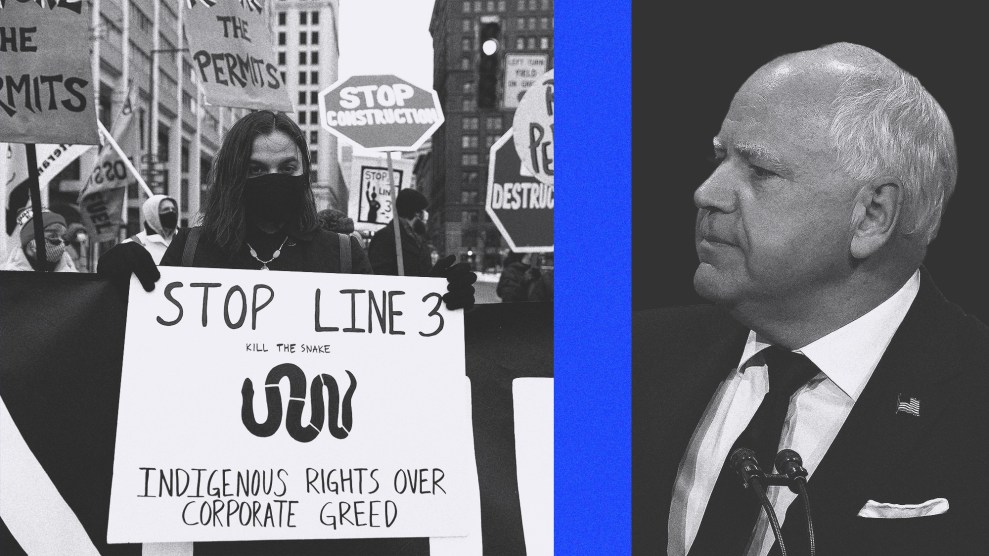In its March/April issue, Mother Jones presents a dire, often depressing, but sadly accurate assessment of the state of the world’s oceans. To many, these issues are brand new, as the crisis in the oceans has largely been “out of sight, out of mind” to date. In reality, the problems afflicting the ocean – too much fishing, too much pollution, and a broken management system – have been with us for years, but little has been done about them.
And while the pace of decline has unquestionably accelerated recently, the real question raised by this series of articles is: “Where is the leadership?” Most environmental groups have been focused largely on terrestrial issues, Congress is missing in action, and the public’s attention is elsewhere (usually on the latest episode of “Survivor” or “Lost”, which is where we might all end up if we don’t reverse current trends).
What does it say that, though we literally “carry the oceans within ourselves,” and though we are so drawn to it that over half the U.S. population lives in a coastal county, our oceans languish in neglect, while the biggest environmental fight of our time is over oil drilling in a patch of Arctic wilderness that most people will never visit, and that has a fraction of the ecological significance of our oceans?
In a 2003 report for the Packard, Oak and Munson Foundations, we looked in detail at the effectiveness of the ocean conservation movement. We found a growing force of highly professional activists pressing for essential reforms but not yet able to muster the political power to achieve victory. While the oceans have bipartisan support in Congress, there are very few champions willing to expend political capital to bring about the needed reforms.
The problem is not a dearth of good facts or the lack of a compelling scientific case. (If you think that an overwhelming scientific consensus is enough to win, look at Congress’ inaction on global warming.) Rather, it has been the conspicuous absence of ocean conservationists from the political arena, and the lack of an effective grassroots base that can be mobilized to pressure politicians for change. The result: extremely limited leverage to reward those politicians who will work to protect the oceans or to hold accountable those who would destroy it.
In part, the fault lies with ocean conservationists ourselves; we have failed to capture the public’s attention on the issues. Not that doing so is easy. Although so much of the population lives near and/or recreates at the ocean, the problems of the ocean are largely abstract and invisible; we can’t see what bottom-trawling does to the floor of the ocean the way we can see what clear-cutting does to a mountainside.
Despite what seems to us a compelling message (an ocean largely devoid of magnificent creatures like marlin, sea turtles, and sharks, replaced by little more than jellyfish) public urgency on this issue is not there. Somewhere there is a breakdown in the “educate, motivate, and activate” sequence.
But all is not lost. We believe there is a latent “grassroots” base of ocean users comprising recreational fishermen, divers, surfers, and sailors, among others. The Marine Fish Conservation Network, for instance, has built an effective coalition of environmentalists and recreational and commercial fishermen to advocate for fisheries reform. And groups like the Surfrider Foundation are turning surfers into activists.
On the political level, for all the challenges, there is cause for optimism, too. Ocean conservationists for many years made the mistake of many people of conscience, believing that involvement in electoral politics was somehow dirty or unethical, and that simply arming political leaders with the “facts” would lead to positive change. If we care about an issue like the oceans, to be successful we must be willing to work to get good people elected and to hold accountable those who are not. That is beginning to change.
The politics of the ocean are often very different from other environmental issues. On the one hand, the oceans have a few tireless champions like Rep. Sam Farr (D-Ca.) who represents the Monterey Bay area. But consider that Rep. Barney Frank (D-Mass.), with generally one of the best environmental voting records Congress, has been leading the fight against tough overfishing regulations in federal law, largely because he has an active concentration of commercial fishermen in his district who could place his re-election in jeopardy if he is not responsive to their demands, however short-sighted they may be. And the senator who has shown the most leadership on fisheries policy is Sen. Ted Stevens (R-AK.), better known for his efforts to open ANWR.
To help ocean conservationists build political power, in 2003 we launched the first political organizations for the oceans, Ocean Champions and Ocean Champions Voter Fund, to help politicians who care about the oceans get elected to Congress (and to defeat bad ones, like Rep. Richard Pombo and to “brand” oceans as a political issue. Our early efforts have been promising. For instance, Ocean Champions endorsed and supported 14 candidates in 2004; 11 were elected, including two brand-new members of Congress (one Republican and one Democrat) who are already taking a leadership role in pushing for positive fisheries legislation and opposing efforts to open up our oceans and coasts to new drilling for oil and gas.
As Mother Jones‘ series of articles makes clear, though, time is short. More resources must be directed by both national and grassroots organizations to the task of awakening the public. This is an issue that should be even more compelling to the public than global warming, if only because so much of the public recreates at the ocean. It will require an unprecedented public relations campaign, far outstripping anything that has gone before it.
Such a successful campaign is going to require ocean conservationists to focus on a single message, one that combines the seriousness of the threat with optimism that it can be overcome. That message must be delivered by credible messengers over and over again until the public demands action.
Are we willing to create the kind of sustained and strategic campaign that persuades the public and our political leaders that this is a crisis that threatens our future as a species? Are we also willing to invest in electoral politics, to help elect members of both parties who will fight for the oceans? These questions must be asked, and they must be answered. It’s a matter of leadership.















